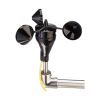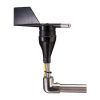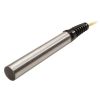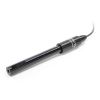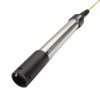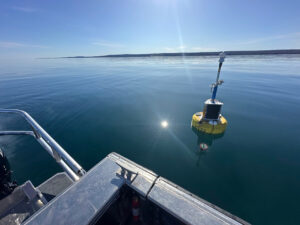Global Water GL500 Multi-Channel Data Logger
Features
- Monitor up to 9 sensors at a time in addition to battery voltage
- Four sample modes: 10 times per second, timed, logarithmic, and exception
- Both USB and Serial communication ports
- Free ground shipping
- Expedited repair and warranty service
- Lifetime technical support
- More
Overview
The Global Water GL500 multi-channel data logger features 7 analog channels and 2 digital channels for data recording. The GL500 can record over 40,000 readings and has four unique recording options, fast (10 samples per second), programmable interval (1 second to multiple years), logarithmic, and exception.
Included
The data logger also has a sample on-demand input that triggers a recording of special events, such as when a water sampler was triggered when a door was opened, etc. Daily start and stop alarm times can be programmed to limit recording intervals. The GL500 includes Windows software, allowing easy upload of data to a laptop or desktop. An optional version with integrated Bluetooth 2.0 allows users to access data and settings without the use of a custom connection cable.
Mechanics
The GL500 data logger is set up to accept any 4-20mA sensor and provides switched power to the sensors based on the sample interval and sensor warm-up time settings. Twisted pair 2-wire and 3-wire sensors can be quickly connected to the data logger's terminal strip and calibrated via the Global data logger software. Sensors can be accessed through dial-out to a remote modem attached to the GL500's serial communication port. The data logger software has online help files that are easily accessed using drop-down menus and links to quickly find the answers to questions.
In The News
Save our Bogs! Culture, Conservation and Climate Action in Ireland’s Peatlands
Characterized by long-term accumulation under waterlogged conditions, peatlands exist on every continent and account for 3-4% of the global land surface . Small but mighty, these often overlooked wetland environments are estimated to hold as much as one-third of the world's organic carbon in their soil—twice the amount found in the entirety of the Earth's forest biomass. While healthy peatlands can trap and store carbon, regulate water, and provide important habitats for rare species, human alteration has disturbed peatland carbon and nitrogen cycles on a global scale. Approximately 12% of the world’s peatlands have been drained and degraded through conversion for agriculture, forestry, infrastructure development, and other uses.
Read MoreSargassum Surge: How Seaweed is Transforming our Oceans and Coastal Ecosystems
Until recently, Sargassum –a free-floating seaweed–was distributed throughout the Sargasso Sea , the north Caribbean Sea, and the Gulf of Mexico. But in the space of a decade, this seaweed has, as one scientist remarks , “Gone from a nonfactor to the source of a terrible crisis.” Driven by climate change, anomalous North Atlantic Oscillation in 2009-2010 and a glut of anthropogenic pollutants, sargassum has proliferated. Seasonally recurrent mats as deep as 7m now bloom in the “Great Atlantic Sargassum Belt” (GASB), which covers areas of the Atlantic from West Africa to the Caribbean Sea and Gulf of Mexico. Every year, millions of tons wash up along the shores of more than 30 countries . Dr.
Read MoreGreat Lakes Research Center: Designing Targeted Monitoring Solutions
According to the National Oceanic and Atmospheric Administration ( NOAA ), the Great Lakes have more miles of coastline than the contiguous Atlantic and Pacific coasts combined and contain 20 percent of the world's freshwater, making it a critical region to protect and conserve. Continuous monitoring and data-informed resource management are key components of managing waters in the region. Hayden Henderson, a research engineer with the Great Lakes Research Center (GLRC), designs and deploys monitoring platforms throughout the Great Lakes. With a background in environmental engineering, Henderson enjoyed the challenge of creating systems and making them work to obtain difficult, remote measurements.
Read More














